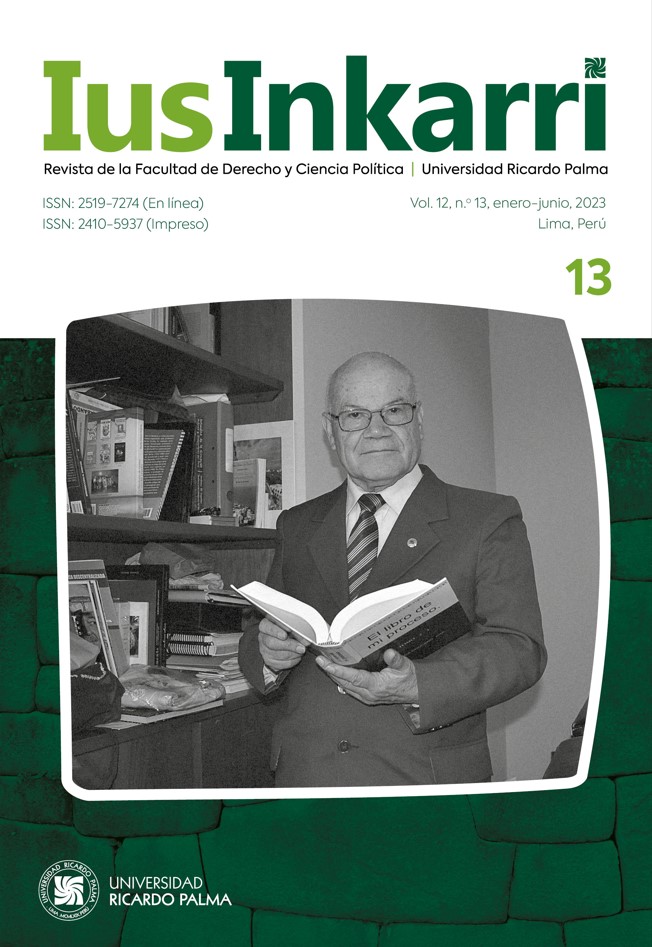Contributions of literature in the training of lawyers
DOI:
https://doi.org/10.59885/iusinkarri.2023.v12n13.08Keywords:
poetry, unknown, spoken world poetry, writing, attentionAbstract
The current article aims to promote the integration of works of literature into the early years of legal education with the objective of training better legal professionals. Discussed are reasons for and ways by which these disciplines can be integrated with a particular focus on the contribution of poetry. The article reviews how poetry can help improve the quality of writing, oral expression, and how it can help promote creativity and detach us from the automatisms of our attention. In addition, it reviews how poetry can play a fundamental role in survival within the hostile environment of the field of law. Finally, it discusses how poetry may offer tools for dealing with the unknown and exploring areas in which we lack training, as they quickly become elementary in a world that has been transformed into a large question mark.
Downloads
References
Alarcón, C. (1999). Cuando me muera quiero que toquen cumbia.
Calvino, I. (2020). Las ciudades invisibles. Siruela.
Di Verso, L. (2019, 6 de enero). Un arte, de Elizabeth Bishop. Zenda. Autores, libros y compañía. https://www.zendalibros.com/un-artede-elisabeth-bishop/
Forn, J. (2009, 16 de enero). La madre de todos los vicios. Página 12. https://www.pagina12.com.ar/diario/contratapa/13-118308-2009-01-16.html
García de Enterría, E. (1999). Curso de derecho administrativo. Civitas.
Garner, B. (2010). Justice Ruth Bader Ginsbur. The Scribes Journal of Legal Writing, 13, 133-144. https://5f83363a-aee4-4e75-a59d-83c22fd072d8.filesusr.com/ugd/3eec74_4b34bdcb341340069f1535bc53481bf9.pdf
González, M. M. (1967). El grado de determinación legal de los conceptos jurídicos. Revista de Administración Pública, (54), 197-292.
Grecco, C. M. (1980). La doctrina de los conceptos jurídicos indeterminados y la fiscalización judicial de la actividad administrativa. La Ley.
Hegel, F. (1985). Lecciones sobre la historia de la filosofía (vol. III). Fondo de Cultura Económica.
La Nación (2015, 27 de febrero). El histórico alegato de Julio César Strassera en el juicio a las juntas militares: «Señores jueces, nunca más». https://www.lanacion.com.ar/politica/el-historico-alegato-de-julio-cesar-strassera-en-el-juicio-a-las-juntas-militares-senores-jueces-nunca-mas-nid1771951/
Marí, E. E. (1986). Racionalidad e imaginario social en el discurso del orden. Doxa. Cuadernos de Filosofía del Derecho, (3), 93-111. https://rua.ua.es/dspace/bitstream/10045/10972/1/Doxa3_07.pdf
Martínez García, J. I. (2012). Derecho e incertidumbre. AFD, (28), 97-118.
Morey, M. (2015). Pequeñas doctrinas de la soledad. Sexto Piso.
Morin, E. (1999). Introducción al pensamiento complejo. Gedisa.
Nussbaum, M. C. (1995). Poetic justice. The literary imagination and public life. Beacon Press.
Oyola, L. (2010, 6 de mayo). Matador. Eterna cadencia. https://www.eternacadencia.com.ar/blog/item/matador.html
Piñeiro, C. (2005). Los finolis de Bernal. Emecé.
Rosner, T. (2020). Poesía secuencia. Qeja Ediciones. https://qeja.s3.amazonaws.com/fanzines/20.+tomas-rosner-Poesi%CC%81a+secuencia-qeja-ediciones.pdf
Sarrabayrouse, M. J. (2011). Poder Judicial y dictadura. El caso de la morgue. Cels.
Skliar, C. (2019). La inútil lectura. Mármara.
Solnit, R. (2020). Una guía sobre el arte de perderse. Fiordo.
Zaidenwerg, E. (2020). Qué es la poesía (yo es nosotros). https://www.instagram.com/ordendetraslado/
Downloads
Published
How to Cite
Issue
Section
License
Copyright (c) 2023 Tomás Rosner

This work is licensed under a Creative Commons Attribution 4.0 International License.













